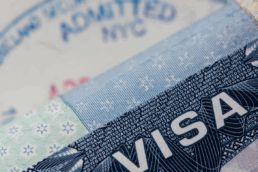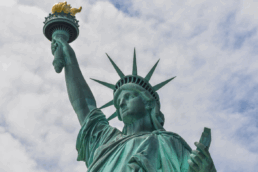The O-1 visa type is for a foreign individual who possesses an extraordinary ability in the sciences, arts, education, business, or athletics, or extraordinary achievement in the film or TV industry, and has been nationally or internationally recognized for their achievements. There are several different categories of O-1 visas, they are as follows:
- O-1A: individuals with an extraordinary ability in the sciences, education, business, or athletics (not including ability in the arts)
- O-1B: individuals with an extraordinary ability in the arts or has extraordinary achievement in the film or TV industry
- O-2: individuals who will accompany an O-1 artist or athlete to assist in their events/performances
- O-3: individuals who are the spouse or children of an O-1 and O-2 visa holders
The filing scenarios for the different types of O visas are very similar to one another but differ in slight ways that make it important for the applicant to pay close attention to what category they are applying for. While the application process begins in very similar ways, the evidence that is needed for each visa varies greatly depending on the applicant’s career or relation to the principal applicant.
For all O-1 and O-2 visas, the applicant’s employer, or agent (the petitioner) must file a Form I-129, Petition for a Nonimmigrant Worker on the applicant’s behalf. USCIS recommends that your employer file a Form I-129 for you at least 45 days from the intended date of employment, but no more than a year before your services are needed. In addition to the Form I-129, your employer must also submit the following evidence demonstrating O-1 and O-2 eligibility:
- Consultations – a written advisory from a peer group (i.e., labor organizations) or a person with expertise in your area of ability. These letters should be on official letterheads or include watermarks and logos of the organizations.
- For O-1B visas, the consultation must come from an appropriate labor union and management organization with expertise in the film or TV industry
- If the petitioner can prove that no appropriate peer groups exist, USCIS will exempt you from this requirement.
- Contracts – the petitioner must provide all written contracts between you and them, detailing the agreement under which you will be employed.
- Itineraries – the petitioner must provide an explanation of the nature of your employment, the dates of the employment, and establish that the employment requires your extraordinary abilities to complete the project.
For O-1A visas, the petitioner must also submit evidence demonstrating your O1 ability in the sciences, business, education, or athletics. USCIS requires at least three different types of documentation corresponding to your achievements. These documents can include receipts of nationally/internationally recognized awards for excellence in their field, published material in major publications about the applicant’s work in their field, the applicant’s authorship of scholarly articles in their field, etc. All of these and more qualify as evidence to support your case.
For O-1B visas, the petitioner’s evidence must prove the applicant’s extraordinary ability in the arts or their achievement in the film or TV industry. The supporting documentation must include evidence of the applicant receiving, having been nominated for a significant national/international award in their field, or at least three of the following forms of evidence of: the applicant achieving recognition for achievements from reviews in major newspapers, journals, etc., record of major commercial or critically acclaimed successes from indicators such as title, rating, box office receipts, etc., contracts indicating that the applicant will command or has commanded a high salary for services in relation to others in the field, etc. All this evidence and more will satisfy the supplemental documentation required.
For O-2 visa holders, their documentation and evidence differ slightly from that of the O-1. O-2 visa applicants must present evidence that they will accompany either an O-1A or O-1B to assist in the O-1 visa holder’s performance. The O-2 applicant must prove that they are an important part of the performance and have relevant skills and experience in their field that a U.S. worker would not possess. For O-2 applicants who will accompany O-1B visa holders, they must have specific evidence proving that:
- They have critical skills and experience performing their activities with the O-1 beneficiary, or
- Should the O-2 be working on a specific film or TV show, they must prove that large portions of the production have taken place outside of the U.S. and will take place within the U.S., and that the O-2 beneficiary is necessary to successfully completing the project.
Should you have a spouse and/or children under the age of 21, they will be eligible to apply for an O-3 nonimmigrant visa that will be subject to the same period of admission as the principal applicant’s visa. O-3 visa holders may not work in the U.S., but they may participate in part-time or full-time studies.
Another interesting topic about O-1 visas is the self-sponsoring option. While technically you cannot self-sponsor for an O-1, there is a loophole should you own your own company (LLC) and have an “employer-employee” relationship. For a self-petition to work with an O-1 visa, you cannot be the sole-operator, owner, etc. You must prove that there are ways for you to be fired, hired, paid, etc. by others besides yourself. One example would be labeling yourself as the “sole or majority stockholder of a corporation” and having other individuals or entities that can control you, such as a Board of Directors. USCIS wants to see a bona fide relationship existing between the employee and employer before you can use your LLC to sponsor yourself. Evidence of this includes:
- Contracts or purchase agreements by other investors
- Bylaws showing board member’s names and responsibilities (must state that the board can fire you)
- Are the investors supervising your work?
- How are your tasks and activities determined?
By providing evidence and documentation of all those examples and more, you as an entrepreneur with your own LLC should be able to “self-sponsor” for an O-1 visa.
Are you interested in applying for an O-1 visa or for sponsoring an O-1/ If so, be sure to contact Berardi Immigration Law to schedule a consult with one of our attorneys today!
Ready to have Berardi on your side?
Whether you’re a business looking to hire or a professional hoping to relocate, immigration law can be complicated. But you don’t have to do it alone. Put our experience to work for you.



